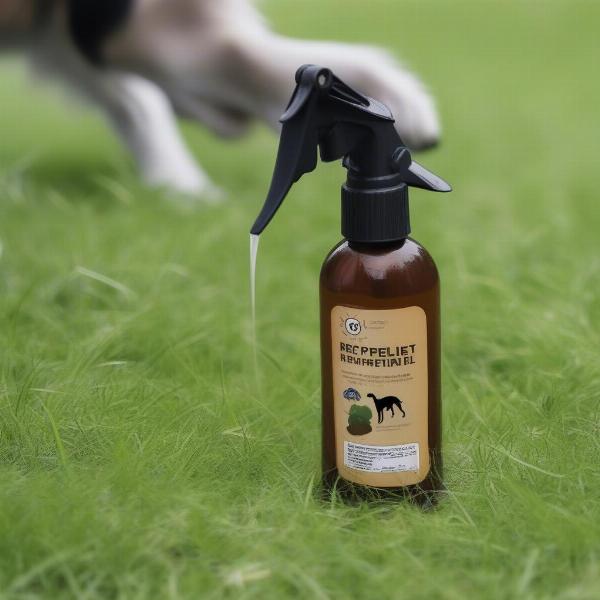Dealing with unwanted dog urination can be frustrating. Whether it’s marking territory inside the house or persistent peeing on your favorite rug, a “spray that keeps dogs from pee” can seem like a tempting solution. This guide explores the effectiveness of dog repellent sprays, delves into the reasons behind inappropriate urination, and provides practical solutions for managing this common pet owner challenge.
Understanding Why Dogs Pee Inappropriately
Before reaching for a repellent spray, it’s crucial to understand why your dog is peeing where they shouldn’t. Medical reasons, such as urinary tract infections, bladder stones, or even cognitive decline, can contribute to incontinence. Anxiety, stress, or a change in routine can also lead to inappropriate urination. Puppies are still learning bladder control, and older dogs might have accidents due to age-related issues. Territorial marking, a common behavior in intact males, can also manifest as spraying urine on vertical surfaces.
Exploring Dog Repellent Sprays
Dog repellent sprays are formulated with ingredients that aim to deter dogs from specific areas. Some contain natural deterrents like citrus or peppermint oils, while others use synthetic chemicals. While these sprays can be helpful in some cases, it’s important to choose a product that’s safe for your pet, your family, and the environment. Always follow the manufacturer’s instructions carefully and test the spray on a small, inconspicuous area first.
Choosing the Right Spray
When selecting a dog repellent spray, consider the following factors:
- Ingredients: Opt for natural, pet-safe ingredients whenever possible. Avoid sprays containing harsh chemicals that could harm your dog or damage your furniture.
- Scent: Some dogs are more sensitive to certain scents than others. Experiment to find a scent that effectively deters your dog without being overwhelming.
- Surface Compatibility: Check the label to ensure the spray is suitable for the surface you intend to treat, whether it’s carpet, furniture, or outdoor plants.
 Dog Repellent Spray Bottle
Dog Repellent Spray Bottle
Addressing the Root Cause of the Problem
While repellent sprays can be a temporary fix, they won’t address the underlying cause of the problem. If your dog’s inappropriate urination is due to a medical condition, a visit to the veterinarian is essential. Behavioral issues, such as anxiety-related urination, may require professional help from a certified dog trainer or behaviorist.
House Training Tips
For puppies or dogs still learning house-training, consistency is key. Establish a regular potty break schedule and reward successful outdoor elimination with praise and treats. Clean up accidents thoroughly using an enzymatic cleaner to eliminate odors that might encourage repeat offenses.
Beyond Sprays: Other Deterrent Methods
Besides repellent sprays, there are other methods you can use to discourage unwanted urination:
- Supervise your dog closely: Especially during the house-training phase, keep a watchful eye on your dog and take them outside frequently.
- Block access to problem areas: If your dog consistently pees in a specific spot, try blocking access to that area until they develop better habits.
- Provide ample opportunities for exercise and mental stimulation: A tired and mentally engaged dog is less likely to engage in destructive behaviors, including inappropriate urination.
Conclusion
While a “spray that keeps dogs from peeing” can be a useful tool in managing unwanted urination, it’s crucial to address the underlying cause of the problem. By combining repellent sprays with proper training, behavioral modification, and veterinary care (if necessary), you can effectively tackle this common pet owner challenge and maintain a clean and harmonious home.
FAQ
- Are dog repellent sprays safe for all dogs? Always check the label and choose a spray formulated with pet-safe ingredients. If you have concerns, consult your veterinarian.
- Will a repellent spray stop my dog from marking territory? While a repellent spray can deter a dog from peeing in a specific spot, it may not eliminate the underlying urge to mark. Neutering or spaying can often help reduce marking behavior.
- How do I clean up dog urine effectively? Use an enzymatic cleaner specifically designed for pet stains. These cleaners break down the uric acid in urine, eliminating the odor that attracts dogs to re-offend.
- What should I do if my dog suddenly starts peeing indoors? Consult your veterinarian to rule out any underlying medical conditions.
- Can anxiety cause a dog to pee inappropriately? Yes, stress and anxiety can lead to inappropriate urination. Consult a certified dog trainer or behaviorist for guidance.
- How often should I take my puppy out for potty breaks? Puppies generally need potty breaks every 2-4 hours, depending on their age and bladder capacity.
- Are there any home remedies to deter dogs from peeing? Some people use diluted vinegar or citrus peels as natural deterrents, but their effectiveness varies.
Related Articles on ILM Dog
About ILM Dog
ILM Dog (ilmdog.com) is your trusted international resource for all things dog-related. From breed selection and puppy care to senior dog health and training tips, we offer expert advice and practical guidance to help you navigate every stage of your dog’s life. Whether you’re a first-time dog owner or a seasoned expert, ILM Dog provides valuable insights into canine health, nutrition, behavior, grooming, and much more. For inquiries regarding our dog products and services, contact us at [email protected] or call +44 20-3965-8624.